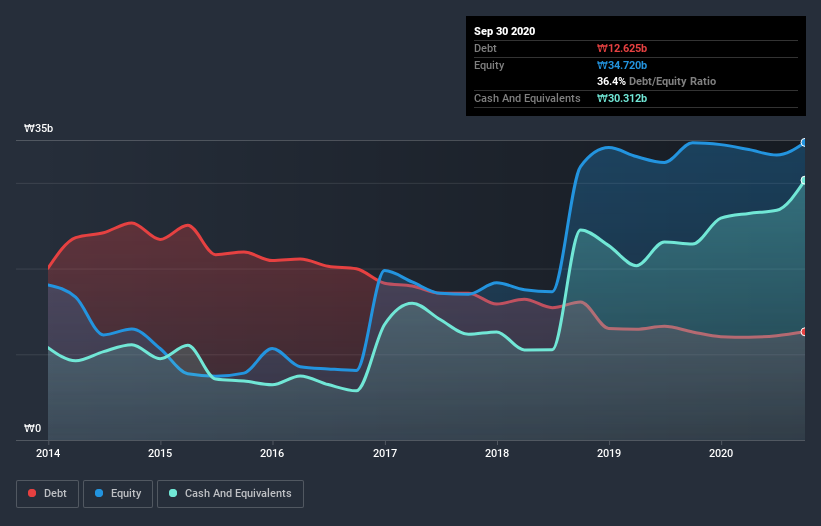Howard Marks put it nicely when he said that, rather than worrying about share price volatility, 'The possibility of permanent loss is the risk I worry about... and every practical investor I know worries about.' When we think about how risky a company is, we always like to look at its use of debt, since debt overload can lead to ruin. As with many other companies ELUON Corporation (KOSDAQ:065440) makes use of debt. But the real question is whether this debt is making the company risky.
What Risk Does Debt Bring?
Debt is a tool to help businesses grow, but if a business is incapable of paying off its lenders, then it exists at their mercy. Ultimately, if the company can't fulfill its legal obligations to repay debt, shareholders could walk away with nothing. However, a more frequent (but still costly) occurrence is where a company must issue shares at bargain-basement prices, permanently diluting shareholders, just to shore up its balance sheet. Of course, plenty of companies use debt to fund growth, without any negative consequences. When we think about a company's use of debt, we first look at cash and debt together.
View our latest analysis for ELUON
How Much Debt Does ELUON Carry?
The chart below, which you can click on for greater detail, shows that ELUON had ₩12.6b in debt in September 2020; about the same as the year before. However, its balance sheet shows it holds ₩30.3b in cash, so it actually has ₩17.7b net cash.

How Healthy Is ELUON's Balance Sheet?
The latest balance sheet data shows that ELUON had liabilities of ₩17.6b due within a year, and liabilities of ₩6.21b falling due after that. Offsetting these obligations, it had cash of ₩30.3b as well as receivables valued at ₩7.58b due within 12 months. So it actually has ₩14.1b more liquid assets than total liabilities.
This surplus strongly suggests that ELUON has a rock-solid balance sheet (and the debt is of no concern whatsoever). With this in mind one could posit that its balance sheet is as strong as beautiful a rare rhino. Simply put, the fact that ELUON has more cash than debt is arguably a good indication that it can manage its debt safely.
In fact ELUON's saving grace is its low debt levels, because its EBIT has tanked 84% in the last twelve months. Falling earnings (if the trend continues) could eventually make even modest debt quite risky. The balance sheet is clearly the area to focus on when you are analysing debt. But it is ELUON's earnings that will influence how the balance sheet holds up in the future. So when considering debt, it's definitely worth looking at the earnings trend. Click here for an interactive snapshot.
Finally, a company can only pay off debt with cold hard cash, not accounting profits. While ELUON has net cash on its balance sheet, it's still worth taking a look at its ability to convert earnings before interest and tax (EBIT) to free cash flow, to help us understand how quickly it is building (or eroding) that cash balance. Over the last three years, ELUON actually produced more free cash flow than EBIT. There's nothing better than incoming cash when it comes to staying in your lenders' good graces.
Summing up
While it is always sensible to investigate a company's debt, in this case ELUON has ₩17.7b in net cash and a decent-looking balance sheet. And it impressed us with free cash flow of ₩4.7b, being 120% of its EBIT. So we don't think ELUON's use of debt is risky. There's no doubt that we learn most about debt from the balance sheet. However, not all investment risk resides within the balance sheet - far from it. For instance, we've identified 1 warning sign for ELUON that you should be aware of.
Of course, if you're the type of investor who prefers buying stocks without the burden of debt, then don't hesitate to discover our exclusive list of net cash growth stocks, today.
If you decide to trade ELUON, use the lowest-cost* platform that is rated #1 Overall by Barron’s, Interactive Brokers. Trade stocks, options, futures, forex, bonds and funds on 135 markets, all from a single integrated account. Promoted
Valuation is complex, but we're here to simplify it.
Discover if ELUON might be undervalued or overvalued with our detailed analysis, featuring fair value estimates, potential risks, dividends, insider trades, and its financial condition.
Access Free AnalysisThis article by Simply Wall St is general in nature. It does not constitute a recommendation to buy or sell any stock, and does not take account of your objectives, or your financial situation. We aim to bring you long-term focused analysis driven by fundamental data. Note that our analysis may not factor in the latest price-sensitive company announcements or qualitative material. Simply Wall St has no position in any stocks mentioned.
*Interactive Brokers Rated Lowest Cost Broker by StockBrokers.com Annual Online Review 2020
Have feedback on this article? Concerned about the content? Get in touch with us directly. Alternatively, email editorial-team@simplywallst.com.
About KOSDAQ:A065440
ELUON
Engages in the development and sales of software and network equipment in South Korea and Indonesia.
Adequate balance sheet with slight risk.
Market Insights
Weekly Picks


Crazy Undervalued 42 Baggers Silver Play (Active & Running Mine)


Fiducian: Compliance Clouds or Value Opportunity?

Willamette Valley Vineyards (WVVI): Not-So-Great Value
Recently Updated Narratives

Moderation and Stabilisation: HOLD: Fair Price based on a 4-year Cycle is $12.08


Positioned globally, partnered locally


When will fraudsters be investigated in depth. Fraud was ongoing in France too.
Popular Narratives


MicroVision will explode future revenue by 380.37% with a vision towards success


NVDA: Expanding AI Demand Will Drive Major Data Center Investments Through 2026





